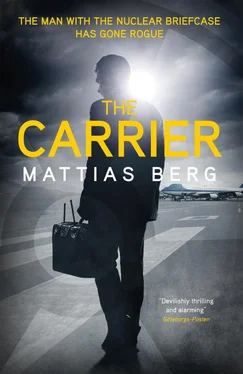Mattias Berg - The Carrier
Здесь есть возможность читать онлайн «Mattias Berg - The Carrier» весь текст электронной книги совершенно бесплатно (целиком полную версию без сокращений). В некоторых случаях можно слушать аудио, скачать через торрент в формате fb2 и присутствует краткое содержание. Город: London, Год выпуска: 2019, ISBN: 2019, Издательство: MacLehose Press, Жанр: Триллер, на английском языке. Описание произведения, (предисловие) а так же отзывы посетителей доступны на портале библиотеки ЛибКат.
- Название:The Carrier
- Автор:
- Издательство:MacLehose Press
- Жанр:
- Год:2019
- Город:London
- ISBN:978-0-85705-788-4
- Рейтинг книги:4 / 5. Голосов: 1
-
Избранное:Добавить в избранное
- Отзывы:
-
Ваша оценка:
- 80
- 1
- 2
- 3
- 4
- 5
The Carrier: краткое содержание, описание и аннотация
Предлагаем к чтению аннотацию, описание, краткое содержание или предисловие (зависит от того, что написал сам автор книги «The Carrier»). Если вы не нашли необходимую информацию о книге — напишите в комментариях, мы постараемся отыскать её.
The Carrier — читать онлайн бесплатно полную книгу (весь текст) целиком
Ниже представлен текст книги, разбитый по страницам. Система сохранения места последней прочитанной страницы, позволяет с удобством читать онлайн бесплатно книгу «The Carrier», без необходимости каждый раз заново искать на чём Вы остановились. Поставьте закладку, и сможете в любой момент перейти на страницу, на которой закончили чтение.
Интервал:
Закладка:
To the official visit to Stockholm and the escape, I had nevertheless brought my—or perhaps I should say our—dissertation. I was after all going to Lise Meitner’s involuntary home. The place of her long, puzzling exile.
And now we were meeting again. After twelve long years it was Ingrid Bergman—“Ingrid”—who walked into the fallout shelter. Pulled the protective doors shut, one after the other.
I tried in vain to make sense of what I was in fact seeing: my former lecturer and supervisor, in full combat gear. Ingrid Bergman seemed to be carrying exactly the same equipment as I was. A uniform with understated insignia, backpack, headlamp, her weapon drawn. In all respects her equipment was the same as my own, apart from the briefcase.
Her hair was short and jet-black, a higher forehead than when I last saw her, her nose bigger. Colored lenses and heavy camouflage completed the job for which the cosmetic surgery had prepared the way. She was changed yet not erased. Someone who knew her would still sense an Ingrid Bergman underneath it all. That quick little smile, the look.
There was so much that I would have liked to ask her. Where she had disappeared to, what had happened, why.
“What are you doing here?” I managed to say.
“I could ask you the same, Erasmus. If I didn’t already know.”
She went to the Nurse, crouched down and muttered “Jesús María… Jesús María…” over and over again, like a prayer. Fingered the glass splinters in the Nurse’s forehead with a troubled look.
And suddenly the Nurse did give a tiny start. There were some weak reflexes in the cheek muscles and the eyelids, a small movement in the left leg. Like a cat moving while dreaming.
“She’ll surface soon,” Ingrid Bergman said.
“I can carry her with me now. We’ve got to get away from here,” I said.
She stared at me.
“Erasmus, my treasure, for the moment we’re lost to the world. Yes, we have to regroup, but not right now. Nobody’s going to find us here. Hardly anyone knows that the system’s intact, that it even exists.”
“But you do?”
“Sure. Too well, probably.”
I looked at her, searching for words. My mind seemed sluggish and helpless in the face of her verbal pirouettes.
“So is it you who is our Alpha?”
“Well, was. Until this morning, when I set off the alarm.”
“Where were you during my escape, in that case, before you got here?”
“Oh, here and there, the usual thing.”
I waited out her artificial pause, hanging on for her confirmation—until it finally came:
“And now it’s we two against the world , Erasmus.”
With her hair cut short she no longer had to fight it, no brushing the fringe out of her eyes as she used to. I could not take my eyes off her.
“You still look like Ingrid Bergman,” I said.
“You think? I’m not sure that was the idea. But here’s the person you’ll soon be able to ask.”
Then she huddled up to the Nurse and immediately fell fast asleep, just like a child.
1.08
I was fumbling far back into my childhood for memories. Scratching away in my notebook while the two women lay there, very close, sharing the same languor. Little by little the picture cleared: like a half-remembered scene out of an old movie.
It was my thirteenth birthday. I was sitting at the kitchen table with my mother. Cryptography already captivated me. I was trying to teach her the basis of book ciphers, even though she was a humanist through and through. To share with her my obsession.
The key to the disclosure of the top secret principles of the atomic bomb, which the Russian spy Theodore Hall had smuggled out of the Manhattan Project, was contained in one of our most famous collections of poetry, which I thought might interest her. Operating at a distance from each other, Hall and his courier Sax had used the same edition of Walt Whitman’s Leaves of Grass for their cipher. The numerical codes indicated which pages, rows and letters of the book should be used to decipher a message.
It was a simple method, which both appealed to and could be understood by someone just into his teenage years—and also, so I supposed, by my mother. Yet it was a significant help in allowing the Soviet Union to detonate their own nuclear test charges much earlier than we had thought possible. Only four years after the bombs that fell on Hiroshima and Nagasaki.
So I picked out an old paid—or maybe it was unpaid—bill from one of Mom’s chaotic piles of paper, turned it over and started to work away in my neat handwriting, explaining as I went along. First we choose a key sentence, I said, for example: “I love you”. Then we give a number to the first letter in each of the three words in the sentence. So 1 stands for I as in “I”, 2 for L as in “Love” and 3 for Y from “You”, right?
But the drawback in using such a short sentence as key, the lost and prematurely middle-aged youth in me continued, is that it gives you so very few numbers and therefore so few possibilities. Because if I write 123 in a cipher which has I love you as its key sentence, that only leaves us with “ILY” in clear. And you can’t encrypt any proper words with such a short key sentence. The code 213 gives you “LIY”, 132 “IYL”, 231 “LYI”, 312 “YIL” and 321 “YLI”.
And it does not have to be some sentence from a book, I said. So long as both sender and recipient—and ideally nobody else in the whole world—know which key sentence they are using.
My mother was staring at the paper, seemed absorbed by it.
“But let’s say that I keep writing,” I said with enthusiasm, “adding to that sentence a little bit at random while we’re sitting here at the kitchen table anyway, for example like this: I love you… just as senselessly as my pretty weird and hellish father, for the time being and onward into eternity, Amen . Then the number of possibilities becomes so much greater. Besides, there’s only you and me who know that this sentence even exists: it can become our own little secret which we’ll never reveal to anybody, can’t it?”
Her faint smile encouraged me to keep going.
“Let’s use that key sentence to decrypt the cipher 122129, for instance. Do you want to have a go, Mom?”
She nodded and put her spectacles on while I gave numbers to all the words in the new sentence, as neatly as before on the back of the bill.
“So let’s begin”, I said, “by taking the easiest interpretation. Let’s read it as 1-2-2-1-2-9. That gives us the first letter in the first word of the key sentence: which is I. Then we have the first letter of the second word, which is L from ‘ love ’. Then another L , another I , another L and finally the first letter in the ninth word: P from ‘ pretty ’. But that doesn’t make up a real word—only ‘ILLILP’.”
“But if you read some of the numbers as two-digit numbers, like this: 12-21-2-9, we get something different. The first letter in the twelfth word in the key sentence is H from ‘ hellish ’. Then you take the first letter from the twenty-first word, which is E from ‘ eternity ’, the first of the second word which is ‘L’ from ‘ love ’ and then the first letter of the ninth word: ‘P’. Do you want to read it out for me, Mom?”
She shook her head. So I read out loud, in my clear little voice: “The book cipher 122129 with this key sentence gives you the clear text HELP.”
I looked proudly at my mother—until I saw her twisted grimace. Then she shut her eyes and put her hands over her ears. Scrunched up the paper. Started to rock back and forth.
Читать дальшеИнтервал:
Закладка:
Похожие книги на «The Carrier»
Представляем Вашему вниманию похожие книги на «The Carrier» списком для выбора. Мы отобрали схожую по названию и смыслу литературу в надежде предоставить читателям больше вариантов отыскать новые, интересные, ещё непрочитанные произведения.
Обсуждение, отзывы о книге «The Carrier» и просто собственные мнения читателей. Оставьте ваши комментарии, напишите, что Вы думаете о произведении, его смысле или главных героях. Укажите что конкретно понравилось, а что нет, и почему Вы так считаете.












